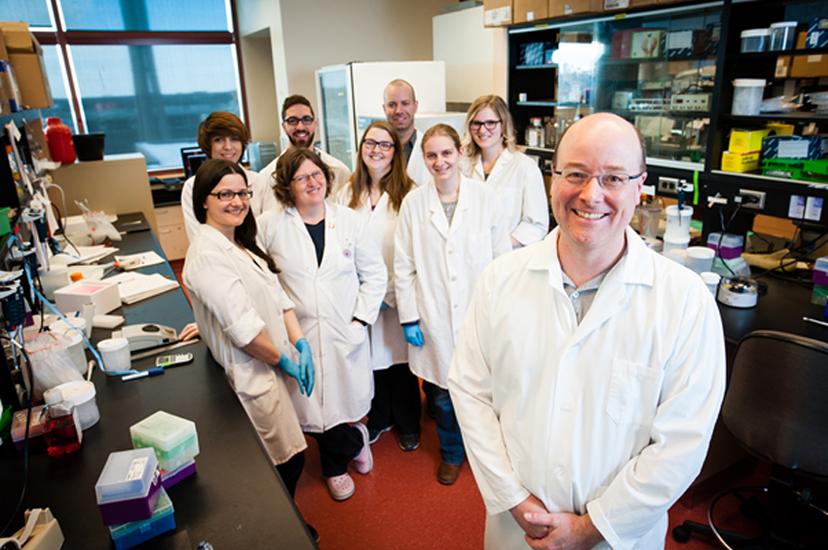Identification and Characterization of Cancer Risk Factors Using High Throughput Cell Screening
Dr Kirk McManus describes how 3D cell culture is advancing his cancer research
16 Jun 2016

The McManus Lab Image: Courtesy of Dr Kirk McManus
Dr Kirk McManus, Associate Professor in the Department of Biochemistry & Medical Genetics at the University of Manitoba and a Senior Scientist within the Research Institute in Oncology at CancerCare Manitoba, spoke to SelectScience® about his cutting-edge cancer research, which aims to identify cancer causing genetic abnormalities and screen potential therapies.
Dr McManus’ research is focused on two main areas:
Integration of the BioSpa™ 8 enabled us to do more long-term, live cell imaging, … which provides a lot more information than standard fixed end-point analysis.
Dr. Kirk McManus University of Manitoba
The identification of aberrant genes that can predispose to cancer development or contribute to its progression
Screening putative cancer therapies that can exploit these genetic defects
The team use a variety of cell based assays and imaging methodologies to identify and investigate genetic risk factors that cause genome instability and predispose carriers to the development of cancer, as well as testing potential modifiers for therapeutic potential.
Chromosome instability and cancer therapy
Mutations that cause genome instability, are known risk factors for the development of several cancers, including colorectal, ovarian and breast. Dr McManus’ research group is working to identify and characterize genetic mutations that predispose to chromosome instability. Such genes are often associated with DNA repair mechanisms and, if silenced or mutated, can result in abnormal chromosome number, a feature associated with tumor growth and development and poor patient prognosis. Synthetic lethal interactors are modulators able to exploit the defects in these risk genes that regulate chromosome instability and are putative therapeutic targets for killing cancer cells.
Screening cells for chromosome instability
Dr McManus and his team have identified genes associated with chromosome instability using a cell based screen. Multiplex, high content assay screening of cells is performed using the Cytation 3 Cell Imaging Multi-Mode Reader from BioTek Instruments Inc. Cell phenotypes of abnormal chromosome number, such as enlargement of the nuclear area or formation of extranuclear micronuclei, can be examined using this imaging system. The team is now using fluorescence microscopy to validate a subset of the putative risk genes and to investigate cellular mechanisms of chromosome instability. The system is also being used to screen candidate synthetic lethal interactors by imaging changes in cell numbers in response to the putative gene modulators.
3D tumor models
Dr McManus’ lab has integrated BioTek Instruments Inc., EL406 Combination Washer Dispenser, BioSpa™ 8 Automated Incubator and Cytation 3 Cell Imaging Multi-Mode Reader, for complete cell culture workflow that allows seeding, maintenance and imaging of cells. In previous studies, cells were fixed for end-point analyses but with the addition of the BioSpa™ 8 Automated Incubator, long-term, live cell imaging analyses of 3D spheroid cell cultures can be performed.
The team is now using the integrated system to screen modulators of genes associated with chromosome instability in 3D tumor spheroids. These 3D spheroid cultures are more biologically relevant than traditional 2D cell cultures and also far more cost effective than animal models, so are ideal for identifying therapeutic candidates for further investigation. Using BioTek’s integrated systems, the team are able to observe formation and growth of tumor spheroids, as well as monitor real-time dynamics of the spheroids, in response to different effector molecules. These data are more physiologically relevant and informative than fixed cell end-point analyses.
Future work
Dr McManus now aims to examine the effects of silencing the previously identified risk genes, to investigate underlying mechanisms that give rise to chromosome instability. In another clinical collaboration, tumor cells isolated from ovarian cancer patients will be used to generate 3D spheroid cultures, which will enable chromosome instability and drug interventions to be examined in real cancer cells. The findings from these studies are not only relevant to ovarian cancer but will be applicable to other cancer types, including colorectal and breast.

